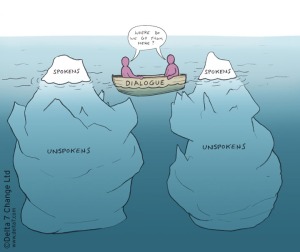As a corporate whistleblower who now presents and provides training to organisations, I have seen it over and over, so often that I’m rarely surprised anymore. Someone at work suggests doing something unethical, and instead of speaking out against it, everyone else either agrees or looks the other way. Alternatively and/or additionally small ethical lapses have cascaded into more significant misconduct and with no one speaking up, the unethical behaviour and the silence become normalised and embedded into the culture and climate of the organisation.
While it’s easy to rattle off a list of deeply held ethics (“I always tell the truth!” “Of course I’ll do the right thing!”), under real-world pressure—when a boss demands an immediate result, when a close friend questions your loyalty, when your’re blinded by the halo of celebrity—aligning your actions with your best intentions can be tricky. Research suggests that what most people think should happen when an ethical challenge looms is inconsistent with what they actually do. In one Northeastern University experiment, subjects were presented with two tasks: one short and easy, one long and tedious. They could either leave their assignment up to a coin toss or choose the easy task and, as a result, leave the next person in line to receive the harder option. Hidden cameras showed that more than 90 percent of participants took the simple task—but when they watched others do the same, they were quick to condemn them.
You might think a person’s values are the product of their upbringing and that after a certain point in life those values don’t change much, but scientists and ethics researchers are finding that’s hardly the case. To do the right thing, you needn’t have been raised a certain way; what matters, many say, is that you put in the effort needed to stay in tip-top ethical shape. The experts often speak of “strengthening your moral muscle,” and they believe that you can train to be more ethical, much as you’d train for a 5K race. Just like being physically fit, being ethically fit takes ongoing practice, we all have the capacity to do good, but it takes work.
Whilst the focus of attention in the ethics and whistleblowing discourse revolves around acknowledging the moral courage of whistleblowers and the pain of their banishment plus the analysis of ‘what went wrong’ and repairing reputational damage I believe the narrative requires a nudge into acting on what we know already.
I will be introducing Social Fitness Training ™ (SFT), a proven methodology to help executives and teams increase collaboration and organisational impact to London from April 2015. This training provides evidence-based tools to train individuals and teams to increase their operational excellence, and act with ethical courage in the face of challenging situations. The model helps individuals and groups to recognise and interrupt the behaviours that prevent them from speaking up in the face of wrongdoing; to counter why in challenging situations the ‘should’ self dominates – we should speak out, should be just, should assert our values only to discover that when the time to act comes, the ‘want’ self dominates – I don’t want to look like a fool, I don’t want to lose my job, I don’t want to be alone. The workshop involves participants role-playing morally challenging situations which are trial runs to help individuals feel more at ease in uncomfortable situations in addition to helping create muscle memory. Individuals are then cognitively supported to act according to their values when stress is running high and fear is creeping close.
Social Fitness Training ™ (SFT) has it’s roots in Stanford University and combines decades of research in the fields of psychology and neuroscience with the work of renowned social psychologists Dr Phil Zimbardo and Dr Lynne Henderson; collaborators during their 25 years at the Stanford Shyness clinic. The workshops have been utilised by companies including Google, Kaiser Permanente, Stanford’s Rock Center for Corporate Governance, Omidyar Network, MIT’s Sloan School and the Australian Capital Territory Government. 
As a whistleblower for the biggest corporate collapse in South African history I ‘won’ an eleven year war of attrition seeing the perpetrators jailed. It was not without sacrifice. My advocacy therefore to governments, organisations, leaders and individuals is to empower individuals with the tools to have the difficult conversations and to train recipients of bad news to act effectively in the nascent stage thereby avoiding a whistleblower entering the scene.
CONSISTENT COURAGEOUS COMMUNICATION
Stay connected to receive updates on course dates and venues.




Leave A Comment